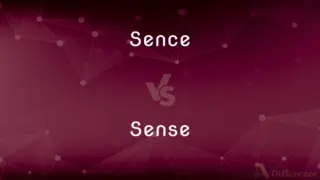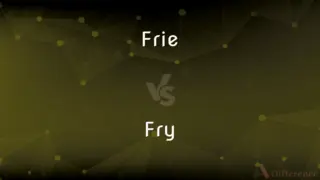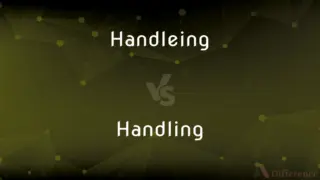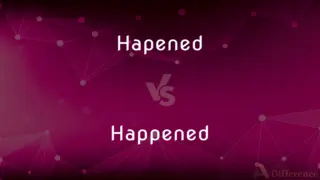Quited vs. Quit — Which is Correct Spelling?
Edited by Tayyaba Rehman — By Fiza Rafique — Updated on April 2, 2024
"Quited" is an incorrect spelling. The correct form is "Quit," which means to stop or discontinue an action or activity.
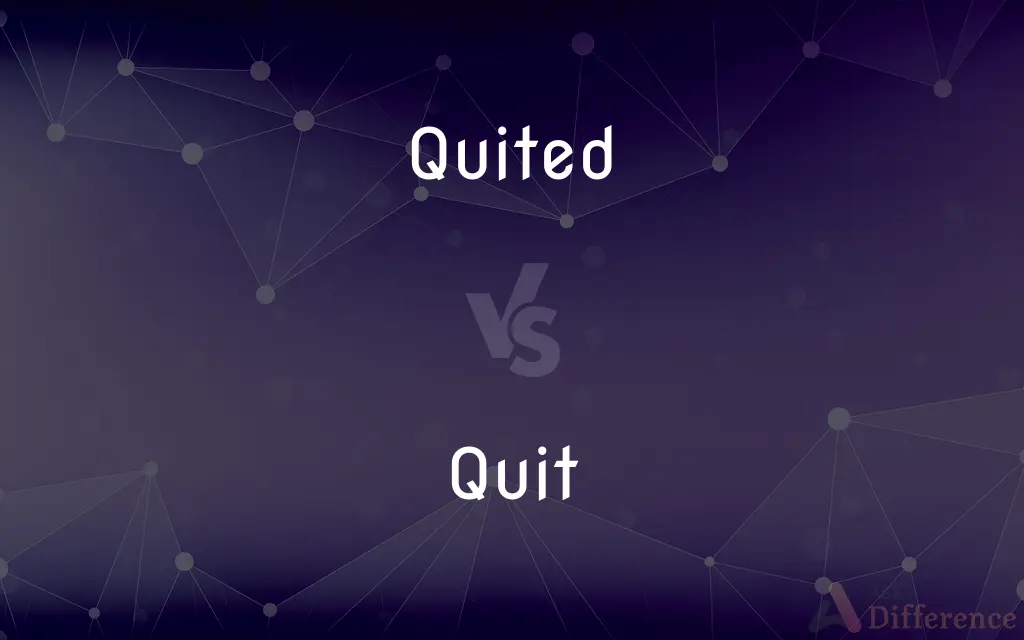
Table of Contents
Which is correct: Quited or Quit
How to spell Quit?

Quited
Incorrect Spelling

Quit
Correct Spelling
ADVERTISEMENT
Key Differences
Avoid adding unnecessary endings to short, one-syllable verbs.
Think of the phrase "I quit" to remember its simplicity.
Remember "quit" is like "hit," a verb that doesn't change in past tense.
Visualize "Quit" as ending abruptly, just like its meaning.
Connect "quit" with "quick" since both have similar beginnings and endings.
ADVERTISEMENT
How Do You Spell Quit Correctly?
Incorrect: She quited the team because of her injury.
Correct: She quit the team because of her injury.
Incorrect: They have quited arguing and found a solution.
Correct: They have quit arguing and found a solution.
Incorrect: He has quited his job last year.
Correct: He has quit his job last year.
Incorrect: I have quited smoking for my health.
Correct: I have quit smoking for my health.
Incorrect: He quited learning French because it was too hard.
Correct: He quit learning French because it was too hard.
Quit Definitions
To stop or discontinue a particular action.
She decided to quit smoking for health reasons.
To exit or depart from a place.
They had to quit the premises immediately.
To cease or discontinue
Asked them to quit talking.
Quit smoking.
To resign from or relinquish
Quit a job.
To depart from; leave
"You and I are on the point of quitting the theater of our exploits" (Horatio Nelson).
To leave the company of
Had to quit the gathering in order to be home by midnight.
(Computers) To exit (an application).
To rid oneself of by paying
Quit a debt.
To release from a burden or responsibility.
(Archaic) To conduct (oneself) in a specified way
Quit yourselves like adults.
To cease an action or cease working properly; stop
The car quit on the hill.
To abandon an activity out of frustration or despair; give up
Saw that he would never get the part and quit.
To resign from or leave a job.
Absolved of a duty or an obligation; free.
(usually followed by of) Released from obligation, penalty, etc; free, clear, or rid.
To pay (a debt, fine etc.).
To repay (someone) for (something).
To repay, pay back (a good deed, injury etc.).
To conduct or acquit (oneself); to behave (in a specified way).
To carry through; to go through to the end.
(transitive) To set at rest; to free, as from anything harmful or oppressive; to relieve; to clear; to liberate.
(transitive) To release from obligation, accusation, penalty, etc.; to absolve; to acquit.
(transitive) To abandon, renounce (a thing).
(transitive) To leave (a place).
To resign from (a job, office, position, etc.).
After having to work overtime without being paid, I quit my job.
To stop, give up (an activity) (usually + gerund or verbal noun).
John is planning to quit smoking.
To close (an application).
Any of numerous species of small passerine birds native to tropical America.
Any one of numerous species of small passerine birds native of tropical America. See Banana quit, under Banana, and Guitguit.
Released from obligation, charge, penalty, etc.; free; clear; absolved; acquitted.
The owner of the ox shall be quit.
To set at rest; to free, as from anything harmful or oppressive; to relieve; to clear; to liberate.
To quit you of this fear, you have already looked Death in the face; what have you found so terrible in it?
To release from obligation, accusation, penalty, or the like; to absolve; to acquit.
There may no gold them quyte.
God will relent, and quit thee all his debt.
To discharge, as an obligation or duty; to meet and satisfy, as a claim or debt; to make payment for or of; to requite; to repay.
The blissful martyr quyte you your meed.
Enkindle all the sparks of natureTo quit this horrid act.
Before that judge that quits each soul his hire.
To meet the claims upon, or expectations entertained of; to conduct; to acquit; - used reflexively.
Be strong, and quit yourselves like men.
Samson hath quit himselfLike Samson.
To have done with; to cease from; to stop; hence, to depart from; to leave; to forsake; as, to quit work; to quit the place; to quit jesting.
Such a superficial way of examining is to quit truth for appearance.
Does not the earth quit scores with all the elements in the noble fruits that issue from it?
To go away; to depart; to stop doing a thing; to cease.
Put an end to a state or an activity;
Quit teasing your little brother
Give up or retire from a position;
The Secretary fo the Navy will leave office next month
The chairman resigned over the financial scandal
Go away or leave
Turn away from; give up;
I am foreswearing women forever
Give up in the face of defeat of lacking hope; admit defeat;
In the second round, the challenger gave up
To resign or leave a job or position.
He quit his job to pursue his passion.
To abandon or give up.
She won't quit, no matter how hard it gets.
To free oneself of something.
He wanted to quit his bad habits.
Quit Meaning in a Sentence
I decided to quit eating junk food to improve my health.
He quit his job to travel the world.
He quit playing video games to focus on his studies.
I had to quit watching TV late at night to get more sleep.
She quit the race because she twisted her ankle.
They plan to quit their band and start a new project.
We quit going to that restaurant because the service was poor.
They've quit offering that service at the library.
I quit drinking coffee, and now I feel much better.
Quit worrying; everything will be okay.
If you quit now, you'll regret it later.
My brother quit his basketball team to play soccer.
She quit the club because she didn't have enough time.
Quit jumping on the bed before you break it.
He quit the competition due to a lack of interest.
He quit the debate club to join the science club.
It's hard to quit bad habits, but it's worth the effort.
She quit talking to him after their argument.
Quit making excuses and start working on your goals.
They quit the idea of moving abroad after considering the costs.
She quit her piano lessons because she lost interest.
Quit biting your nails; it's a bad habit.
I quit trying to please everyone and started living for myself.
Quitting soda has improved my health significantly.
She quit using social media to spend more time with her family.
Quit Idioms & Phrases
Quit cold turkey
To stop doing something abruptly, without any gradual decrease in action.
He decided to quit smoking cold turkey instead of using nicotine patches.
Quit while you're ahead
To stop doing something while you are still successful or winning before your luck changes.
You've won three games in a row, so maybe you should quit while you're ahead.
No quit in someone
A phrase used to describe someone who is very determined and doesn't give up easily.
Despite the challenges, she has no quit in her and continues to pursue her goals.
Quit the scene
To leave a place or cease to be involved in a situation.
After the scandal, he quit the scene and moved to a different city.
Quit the field
To withdraw from a competition or a challenge, often because it's too difficult to continue.
After several failed attempts, he decided to quit the field and try something else.
Quit oneself well
To perform in a capable or satisfactory manner.
She quit herself well in her first debate competition, impressing the judges.
Common Curiosities
Why is it called Quit?
The term originates from Old French "quiter" meaning "to release."
What is the pronunciation of Quit?
/kwɪt/
Which preposition is used with Quit?
"On" as in "quit on someone."
Which vowel is used before Quit?
It depends on the context, but typically "a" or "the."
Is Quit a noun or adjective?
Primarily a verb, but can also be a noun in certain contexts.
What is the plural form of Quit?
Quit does not have a plural form as it's a verb.
What is the verb form of Quit?
Quit.
What is the singular form of Quit?
Quit.
Is Quit an adverb?
No.
Is Quit an abstract noun?
No.
What is the root word of Quit?
Old French "quiter."
Which conjunction is used with Quit?
Any conjunction can be used, depending on the sentence context.
Is Quit a collective noun?
No.
Is Quit a vowel or consonant?
"Quit" is a word containing both vowels and consonants.
Is the word Quit imperative?
Yes, as in "Quit now!"
How many syllables are in Quit?
One.
What is a stressed syllable in Quit?
The entire word "quit" is stressed.
Is the Quit term a metaphor?
It can be used metaphorically, such as "quit the scene."
How do we divide Quit into syllables?
Quit is one syllable and cannot be divided.
Is Quit a countable noun?
No.
What part of speech is Quit?
Verb.
What is another term for Quit?
Resign.
Which determiner is used with Quit?
It depends on the context; "this" or "that" might be used.
What is the second form of Quit?
Quit.
Which article is used with Quit?
It depends on the context, but typically "a" or "the."
Is the word “Quit” a Direct object or an Indirect object?
It can be either, depending on the sentence.
What is the opposite of Quit?
Continue or persist.
What is the third form of Quit?
Quit.
Is Quit a negative or positive word?
Neutral, but context can give it a negative or positive connotation.
Is the word Quit a gerund?
No, but "quitting" is.
What is the first form of Quit?
Quit.
How is Quit used in a sentence?
"She decided to quit her job and travel the world."
Share Your Discovery
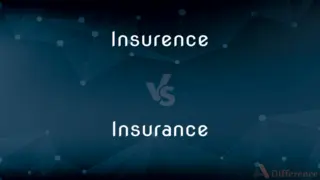
Previous Comparison
Insurence vs. Insurance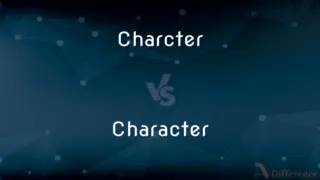
Next Comparison
Charcter vs. CharacterAuthor Spotlight
Written by
Fiza RafiqueFiza Rafique is a skilled content writer at AskDifference.com, where she meticulously refines and enhances written pieces. Drawing from her vast editorial expertise, Fiza ensures clarity, accuracy, and precision in every article. Passionate about language, she continually seeks to elevate the quality of content for readers worldwide.
Edited by
Tayyaba RehmanTayyaba Rehman is a distinguished writer, currently serving as a primary contributor to askdifference.com. As a researcher in semantics and etymology, Tayyaba's passion for the complexity of languages and their distinctions has found a perfect home on the platform. Tayyaba delves into the intricacies of language, distinguishing between commonly confused words and phrases, thereby providing clarity for readers worldwide.












